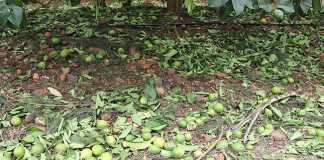This is according to Dr Rikus Kloppers, senior plant pathologist at seed breeder Pannar. Addressing a media contingent at Pannar’s headquarters in Greytown, KwaZulu-Natal, Kloppers refuted claims that GM grain was dangerous to humans and said that it could in fact contribute to human health. He quoted research by Iowa State University in the US showing that the fungi Fusarium verticilliodes and Fusarium proliferatum in maize produce mycotoxins, of which two are considered carcinogenic.
The most common mycotoxin, Fumonisin 2, has been linked to reported incidences of oesophageal (throat) cancer in humans. Kloppers said that some of the highest incidences of throat cancer in the world had been reported in the former Transkei areas of the Eastern Cape and are directly linked to Fusarium stalk rot in maize. The Medical Research Council of SA consequently set up a cancer research register in the districts of Butterworth, Centane, Bizana and Lusikisiki more than 20 years ago to obtain data on throat cancer in the region.
Kloppers said the fact that the local population ate grain from maize infected with Fusarium stalk rot had played a significant role in the occurrence of the cancers. In studies conducted on GM maize cultivars that were resistant to stalk borer insects, the reduced damage by the insects had brought about a decline of secondary Fusarium infections and the production of mycotoxins.
“This has obviously played a vital role in the prevention of throat cancer. Maize is a staple for people in Africa, which makes this technology even more relevant on the continent,” he said. Kloppers added that drought-resistant hybrids would become increasingly important in South Africa, not only in drier or marginal production regions, but also due to escalating electricity costs. He said the occurrence of abnormal weather should also be considered in the development of new hybrids.












